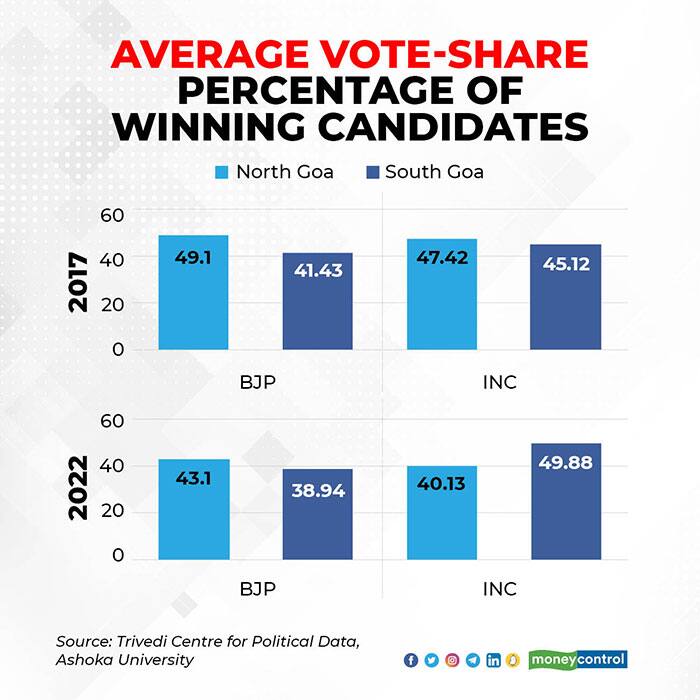



In the recently held elections for the 40-member assembly of Goa, the Bharatiya Janata Party (BJP) and the Indian National Congress (INC) bagged the most number of seats at 20 and 11 respectively. But, the real story about the state’s politics and its volatility lies in the existence of the many regional parties, loyal electorates and slippery candidates.
What explains the existence of so many smaller parties, the extirpation of Congress, and the fiefdoms that these candidates? These are some of the questions we are trying to answer in this piece.
After the 2017 assembly elections of the state, the INC emerged as the victor but slowly the emigration of their MLAs reduced the party to just two candidates. The story, however, was not limited to this, for defections are not considered a very huge deal in Goa.
We have seen how candidates are not punished for turning coats, before, during or after elections.
Read also: EVMs or Raj Bhavans: Who picks the governments in smaller states?
GOP losing foothold
The bigger story is the erosion of the vote share of India’s Grand Old Party after every election. In 2017, even though it won only 17 seats, it commanded over 28 percent of the vote share. The decline in their vote share is well established. What is tricky, however, is the contrast in vote share for BJP and Congress when seen region-wise:

For the Congress party, there are a couple of factors that seem to contribute to the party's steady decline in the state. First, is their replacement by a nationally dominant party--the BJP. The contest in Goa has always been between one dominant party with a second player (switches between regional as well as a national party). Now that the BJP dominates our national politics, the same is reflected in the state. The other is the fragmentation of its vote share in the state by several regional as well as new entrants.
For instance, parties such as the TMC gain seem to gain at their expense. TMC’s vote share has increased in this election and that has come directly from Congress’s vote bank or AAP made a dent in the Catholic vote base that traditionally went with the Congress.
A third, related argument for its decline is the smaller regional parties don’t seem to be eager to join the Congress’s coalition in the state as well. Makes sense for them because it is of course far more beneficial to align with the BJP at the moment. This was made clear a few days ago when the BJP’s seat count stopped at 20 and several of these smaller parties sprung to support the BJP in forming the government.
What explains this contrast? What is the reason behind the increase in vote share of Congress in South Goa? Why has the BJP not been able to make inroads in the coastal region of the state despite a continued mandate by the rest of the region?

We hypothesise that the reason for all the anomalies seen in the state is because of the smaller size of the electorate. This hypothesis is further supported by the conversations we have had with several experts on Goan politics. The electorate is so small that there are only about 30 thousand voters in any constituency, so for a candidate to win they need only about 8000 to 10,000 votes.
The fragmentation in Goan politics by the presence of several smaller parties like the Maharashtrawadi Gomantak Party (MGP), Goa Forward Party (GFP), Revolutionary Goans Party (RGP), etc make it easier for candidates to not simply win seats but create individual fiefdoms. Consider the unique case of RGP--the party only ended up with one MLA in the state but controls more than 9 percent of the vote share across the state.
The election-winning strategy for any candidate in Goa is further aided by the first-past-the-post system. They don’t even need to woo all the citizens in their constituency but only about 7,000 to 8,000 of them can fetch them their seats. This cult status, that most (if not all) candidates enjoy in Goa is further supported by how the second runner up performs in each constituency of Goa.
Data suggests that the vote share of candidates that get to the third position in constituencies across Goa averaged at 14 per cent. This is a huge number because generally the vote share is divided among the top two candidates and the third candidate is a distant third. The only reason why all of this would happen in Goa is because of the cult that these candidates can and do create in their constituencies. Whether right or wrong, this seems to be the only explanation for the volatility of Goa’s politics which has implications for the survival of democracy in the country.
If things will change or not is something that all of us will have to wait and see.
Discover the latest Business News, Sensex, and Nifty updates. Obtain Personal Finance insights, tax queries, and expert opinions on Moneycontrol or download the Moneycontrol App to stay updated!
Find the best of Al News in one place, specially curated for you every weekend.
Stay on top of the latest tech trends and biggest startup news.